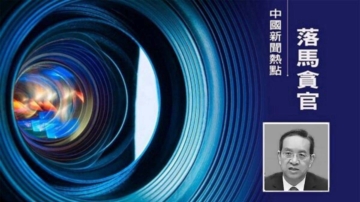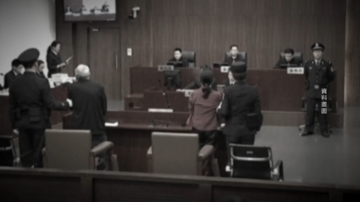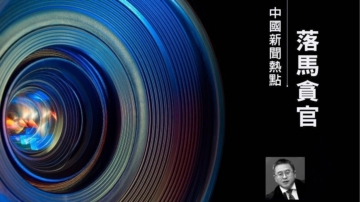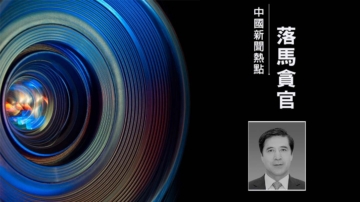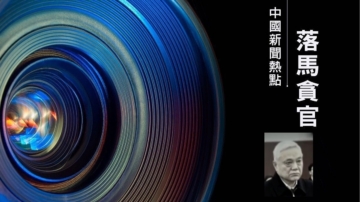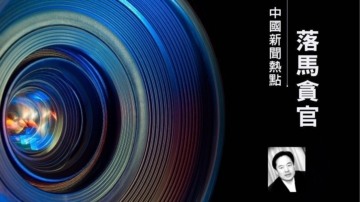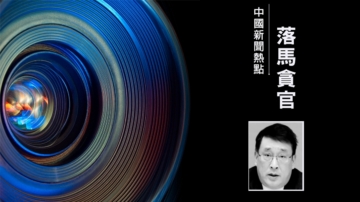【新唐人2014年05月07日讯】在“5.4”这个敏感的日子,中共总书记习近平拜访了“五四运动”的发源地——北京大学。在“北大”,习近平勉励学生继续保持与坚守“五四运动” 的革命运动精神。不过,“北大”还是“八九学运”的发源地,习近平在那里也会见了支持“八九学运”的老教授。请看以下报导。
在“五四青年节”当天,习近平除了与“北大”学生互动之外,他的另一项活动也引起了人们的关注。
中共新闻联播是这样报导的:“4日,总书记来到北大人文学苑,会见了87岁的着名哲学家汤一介。”
但是,官媒有意省去汤一介曾经参加“八九学运”的背景。
“八九学运”十大事件中,其中一件是诗人北岛牵头,由33名中国知名知识界、文化界学者和作家签名,要求中共释放魏京生等政治犯。签名者中就有汤一介。
1994年,四十多位中国的知名学者和作家,再次联名签署发起了“纪念联合国宽容年”的公开信,汤一介又签了名。
出生于1927年的汤一介,在毛泽东时代就受“反右”冲击、在“文革”时受到批判,还下放到干校劳动。1978年汤一介才被平反,1980年恢复他讲课资格。
旅美中国社会问题研究人士张健:“他见汤一介的确是经过了深思熟虑的。也有其中一部分原因是想撇开和六四刽子手的这样一个关系。另外还一种原因,我相信在民怨沸腾的时候,习近平用这种方式,似乎又给当年89六四的这帮人有一些希望。”
今年是“六四惨案”25周年,海内外都在筹备这个重要的纪念日。
《美国之音》指出,今天的中共高干,包括“六四”当年的主要人物李鹏、陈希同都出回忆录,都想推卸和撇开自己的责任。习近平接见参加过“八九民运”的老教授,显然是向外界表明自己和“六四”无关。
旅美中国社会问题研究人士张健表示,如果习近平真想与“六四”划清界限的话,就要勇于承认中共在“89六四”、“79民主墙”、“99法轮功”事件中所犯下的罪行,勇于承认。
时事评论员林子旭认为,今天的中国,中共最终需要在政治、经济、人权等诸多问题上做一个了断,这是历史大势,也是谁都无法抗拒的。
时事评论员林子旭:“现任中共高层面临的境遇,很像很多投资房产的商家,该出手时不出手,等到房地产彻底崩盘的时候一切就都晚了。”
正在给习近平写第九封公开信的秦永敏表示,中共要想避免未来被大清算,避免社会大动荡,最低必须对公民提供“人身权利保障、财产权利保障和言论权利保障”。
秦永敏指出,如果习近平能够因势利导,拿出具体行动促成中国社会的转型,那么他就会成为历史的伟人。
秦永敏:“从历史的角度来看,一个国家领导人,特别是在社会大动荡的时候,他的回旋馀地是很有限的。他想倒退也走不太远,因为有很多因素制约﹔那么,如果他想有所作为,那么倒是可以有很多机会。”
张健认为,还政于民、进行普选,让多党执政,这是习近平应该做的事情。这样习才能与中共这架邪恶的战车脱离,才会在历史上有一个好位置。
采访/朱智善 编辑/宋风 后制/舒灿
Xi Jinping Side Steps The June Fourth Massacre by Shaking the
Hand of then Participant
Chinese Communist Party (CCP) General Secretary Xi Jinping
visited Peking University, the 1919 May Fourth Movement
birthplace.
Xi encouraged the students to insist on and adhere to the spirit
of the revolutionary May Fourth Movement.
Peking University is also the birthplace of the 1989 student
movement, Xi Jinping met a senior faculty member
who was a supporter
of the 1989 student movement.
The following is our report.
On the Youth Day, Xi Jinping interacted with students at
Peking University.
However, his other activity also drew attention.
Mainland media reported that Xi visited the 87-year-old
Tang Yijie, a philosophy scholar of Peking University.
After shaking hands with Tang, Xi spoke with Tang in his study
and praised his contribution to the inheritance, development
and innovation of traditional Chinese culture.
However, the media have intentionally omitted Tang Yijie's
role in the 1989 student movement.
During the 1989 student movement, poet Bei Dao had led 33
Chinese intellectuals demanding the release of political
prisoners including Wei Jingsheng.
Tang Yijie was one of the participants.
In 1994, more than forty well-known Chinese scholars and
writers jointly launched an open letter to commemorate the
United Nations Year for Tolerance.
Tang Yijie once again was one the participants.
Tang Yijie was born in 1927.
He was subject to Mao Zedong's anti-rightist movement
during the Cultural Revolution.
He was sent to the cadre school for labor education.
Tang Yijie was finally rehabilitated in 1978, and resumed
his lecturer position in 1980.
Zhang Jian, China's social problems researcher: "His meeting
with Tang Yijie was definitely thoroughly thought through.
He might want to cut his relationship with the murderers of
the June 4 Massacre.
Another possibility is that Xi Jinping seems to provide some
hope to the victims of the 1989 student movement at the time
of much grief in society."
This year marks the 25th anniversary of the June Fourth
Massacre, commemorated by people both at home and abroad.
Voice of America reported that many senior cadres such as
Li Peng and Chen Xitong have published memoirs trying to
evade their responsibilities for the June 4 massacre.
Xi Jinping's visiting the senior professor who was a
participant of the 1989 student movement was obviously to
demonstrate his irrelevance to the incident.
Chinese social problems researcher Zhang Jian indicates that
for Xi Jinping to cut clean with the June 4 Massacre, he must
recognize and admit the crimes the CCP has committed in
the 1989 student movement, the 1979 Democracy Wall, and
the 1999 Falun Gong persecution.
But in reality, Zhang Jian points out that Xi Jinping has been
holding on to Mao Zedong on one hand and trying to create
a friendly image on the other.
He's trying to please both the left and the right.
Chinese human rights activist Qin Yongmin believes that
Xi Jinping's bottom line has been to save the CCP and its
rule in China.
Qin Yongmin, Human Rights in China founder: "He proposed
the Eleven Safety.
The first and foremost safety is political security.
To him, political security demands no subversive political
reform. That is to insist on the CCP's leadership."
Commentator Lin Zixu believes that today's China is faced
with a historical trend that no one can resist.
That is the CCP must face the issues of politics, the economy,
human rights and many others.
Linzi Xu, commentator: "The CCP leadership is faced with
a situation similar to the real estate investors.
When it's time to sell, sell.
Otherwise, once there's a real estate meltdown, it will be too late."
Qin Yongmin is writing his ninth open letter to Xi Jinping.
He indicates that to avoid liquidation and social upheaval,
the CCP must provide the minimum protection of personal
rights, property rights and speech rights.
Qin Yongmin believes that if Xi Jinping can make the best use
of the current situation and promote the transformation of
Chinese society, then he will make a name for himself in
history.
Qin Yongmin: "From a historical perspective, for a national
leader, especially in the time of social upheaval, his room for
maneuver is very limited.
He can't back down too much because of many restricting
factors. However, there are many opportunities if he intends
to do something."
Zhang Jian believes that to return the government to the people,
conduct universal suffrage, and multi-party rule, are what
Xi Jinping should do.
That's how Xi can jump off the CCP evil chariot and
reposition himself in history.
Interview/Zhu Zhishan Edit/Song Feng Post-Production/Shu Can
在“五四青年节”当天,习近平除了与“北大”学生互动之外,他的另一项活动也引起了人们的关注。
中共新闻联播是这样报导的:“4日,总书记来到北大人文学苑,会见了87岁的着名哲学家汤一介。”
但是,官媒有意省去汤一介曾经参加“八九学运”的背景。
“八九学运”十大事件中,其中一件是诗人北岛牵头,由33名中国知名知识界、文化界学者和作家签名,要求中共释放魏京生等政治犯。签名者中就有汤一介。
1994年,四十多位中国的知名学者和作家,再次联名签署发起了“纪念联合国宽容年”的公开信,汤一介又签了名。
出生于1927年的汤一介,在毛泽东时代就受“反右”冲击、在“文革”时受到批判,还下放到干校劳动。1978年汤一介才被平反,1980年恢复他讲课资格。
旅美中国社会问题研究人士张健:“他见汤一介的确是经过了深思熟虑的。也有其中一部分原因是想撇开和六四刽子手的这样一个关系。另外还一种原因,我相信在民怨沸腾的时候,习近平用这种方式,似乎又给当年89六四的这帮人有一些希望。”
今年是“六四惨案”25周年,海内外都在筹备这个重要的纪念日。
《美国之音》指出,今天的中共高干,包括“六四”当年的主要人物李鹏、陈希同都出回忆录,都想推卸和撇开自己的责任。习近平接见参加过“八九民运”的老教授,显然是向外界表明自己和“六四”无关。
旅美中国社会问题研究人士张健表示,如果习近平真想与“六四”划清界限的话,就要勇于承认中共在“89六四”、“79民主墙”、“99法轮功”事件中所犯下的罪行,勇于承认。
时事评论员林子旭认为,今天的中国,中共最终需要在政治、经济、人权等诸多问题上做一个了断,这是历史大势,也是谁都无法抗拒的。
时事评论员林子旭:“现任中共高层面临的境遇,很像很多投资房产的商家,该出手时不出手,等到房地产彻底崩盘的时候一切就都晚了。”
正在给习近平写第九封公开信的秦永敏表示,中共要想避免未来被大清算,避免社会大动荡,最低必须对公民提供“人身权利保障、财产权利保障和言论权利保障”。
秦永敏指出,如果习近平能够因势利导,拿出具体行动促成中国社会的转型,那么他就会成为历史的伟人。
秦永敏:“从历史的角度来看,一个国家领导人,特别是在社会大动荡的时候,他的回旋馀地是很有限的。他想倒退也走不太远,因为有很多因素制约﹔那么,如果他想有所作为,那么倒是可以有很多机会。”
张健认为,还政于民、进行普选,让多党执政,这是习近平应该做的事情。这样习才能与中共这架邪恶的战车脱离,才会在历史上有一个好位置。
采访/朱智善 编辑/宋风 后制/舒灿
Xi Jinping Side Steps The June Fourth Massacre by Shaking the
Hand of then Participant
Chinese Communist Party (CCP) General Secretary Xi Jinping
visited Peking University, the 1919 May Fourth Movement
birthplace.
Xi encouraged the students to insist on and adhere to the spirit
of the revolutionary May Fourth Movement.
Peking University is also the birthplace of the 1989 student
movement, Xi Jinping met a senior faculty member
who was a supporter
of the 1989 student movement.
The following is our report.
On the Youth Day, Xi Jinping interacted with students at
Peking University.
However, his other activity also drew attention.
Mainland media reported that Xi visited the 87-year-old
Tang Yijie, a philosophy scholar of Peking University.
After shaking hands with Tang, Xi spoke with Tang in his study
and praised his contribution to the inheritance, development
and innovation of traditional Chinese culture.
However, the media have intentionally omitted Tang Yijie's
role in the 1989 student movement.
During the 1989 student movement, poet Bei Dao had led 33
Chinese intellectuals demanding the release of political
prisoners including Wei Jingsheng.
Tang Yijie was one of the participants.
In 1994, more than forty well-known Chinese scholars and
writers jointly launched an open letter to commemorate the
United Nations Year for Tolerance.
Tang Yijie once again was one the participants.
Tang Yijie was born in 1927.
He was subject to Mao Zedong's anti-rightist movement
during the Cultural Revolution.
He was sent to the cadre school for labor education.
Tang Yijie was finally rehabilitated in 1978, and resumed
his lecturer position in 1980.
Zhang Jian, China's social problems researcher: "His meeting
with Tang Yijie was definitely thoroughly thought through.
He might want to cut his relationship with the murderers of
the June 4 Massacre.
Another possibility is that Xi Jinping seems to provide some
hope to the victims of the 1989 student movement at the time
of much grief in society."
This year marks the 25th anniversary of the June Fourth
Massacre, commemorated by people both at home and abroad.
Voice of America reported that many senior cadres such as
Li Peng and Chen Xitong have published memoirs trying to
evade their responsibilities for the June 4 massacre.
Xi Jinping's visiting the senior professor who was a
participant of the 1989 student movement was obviously to
demonstrate his irrelevance to the incident.
Chinese social problems researcher Zhang Jian indicates that
for Xi Jinping to cut clean with the June 4 Massacre, he must
recognize and admit the crimes the CCP has committed in
the 1989 student movement, the 1979 Democracy Wall, and
the 1999 Falun Gong persecution.
But in reality, Zhang Jian points out that Xi Jinping has been
holding on to Mao Zedong on one hand and trying to create
a friendly image on the other.
He's trying to please both the left and the right.
Chinese human rights activist Qin Yongmin believes that
Xi Jinping's bottom line has been to save the CCP and its
rule in China.
Qin Yongmin, Human Rights in China founder: "He proposed
the Eleven Safety.
The first and foremost safety is political security.
To him, political security demands no subversive political
reform. That is to insist on the CCP's leadership."
Commentator Lin Zixu believes that today's China is faced
with a historical trend that no one can resist.
That is the CCP must face the issues of politics, the economy,
human rights and many others.
Linzi Xu, commentator: "The CCP leadership is faced with
a situation similar to the real estate investors.
When it's time to sell, sell.
Otherwise, once there's a real estate meltdown, it will be too late."
Qin Yongmin is writing his ninth open letter to Xi Jinping.
He indicates that to avoid liquidation and social upheaval,
the CCP must provide the minimum protection of personal
rights, property rights and speech rights.
Qin Yongmin believes that if Xi Jinping can make the best use
of the current situation and promote the transformation of
Chinese society, then he will make a name for himself in
history.
Qin Yongmin: "From a historical perspective, for a national
leader, especially in the time of social upheaval, his room for
maneuver is very limited.
He can't back down too much because of many restricting
factors. However, there are many opportunities if he intends
to do something."
Zhang Jian believes that to return the government to the people,
conduct universal suffrage, and multi-party rule, are what
Xi Jinping should do.
That's how Xi can jump off the CCP evil chariot and
reposition himself in history.
Interview/Zhu Zhishan Edit/Song Feng Post-Production/Shu Can

